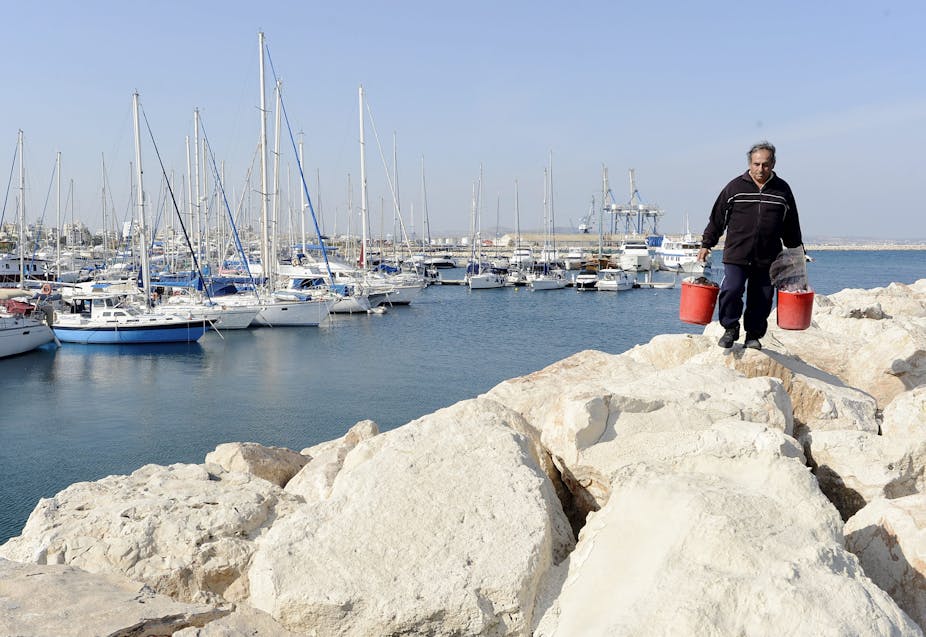The desperation the Cypriot government finds itself in cannot be exaggerated. In the scheme of things, it seems small, but the nature of each Eurozone crisis is that the small problems are often the largest. The breaches in the dam are not being stemmed.
Last year, Cyprus made it to the bail-out list of ailing patients in the Eurozone. It was fitting that the troika (the European Commission, the European Central Bank and the IMF) arrived with their officials in Cyprus just as their government was taking over the presidency of the European Union. As the German tabloid Bild suggested with dripping sarcasm: “A bankrupt island takes over power in Europe.”
Some critics wondered what on earth Cyprus was doing in the zone to begin with. The fact that no deal for reunification was struck with the Turkish-Cypriot north was a glaring point. But history’s bitter ironies are all coming thick and fast as the EU project is being battered.
The deal for the bailout was hammered out on Saturday. No one was happy. The bill for creditor countries was reduced from €17 billion to €10 billion. A 9.9% levy was suggested as an impost on all deposits above the insurance threshold of €100,000 before the banks would reopen after the bank holiday on Monday.
This would have covered uninsured deposits coming in from outside Cyprus, much of it Russian. But negotiators had a nasty surprise in their bag of tricks: a lesser levy would be extended to include those below the threshold as well.
To soften the blow, those facing a levy would be able to claim shares in Cyprus’s banks with a possibility of a share in the untested gas reserves once the economy has improved.
The proposal certainly kicked over the hornet’s nest. Cypriots found that bank branches had closed to them – a 6.75% loss was registered for savers with deposits that fell below the insurance ceiling.
Exemptions were made for those holding accounts with €20,000 or less, but the damage had been done. This effectively punished depositors who should never have figured in the mix.
Nor were the Russians impressed, with Russian President Vladimir Putin railing against the proposal as a Brussels - Berlin assault on his country’s citizens. Never mind the history of dubious deposits that has characterised that line of business now for years.

That government measure increasing the pool of depositors to draw upon was not encouraged by the troika. Furthermore, going for a Brussels-bailout is akin to signing up to an austerity deal with German trimmings.
The European Central Bank’s chief negotiator Joerg Asmussen has made it clear that the ECB will abandon the Cypriot banks to their doom if the bailout medicine is not taken.
This has appalled protesters, who have branded protest banners with German Chancellor Angela Merkel as a modern day Hitler. The suggestion is as false as it is tragic.
It is incontestable that Cypriot banks became the repositories of laundered money for some time. Analysts claim that some cleaning up has taken place, though the tarnish remains.
What has happened in the last few years is that Russian investors have found much to admire in the Cypriot banking system. Protocols on taxation have been ratified between the countries, making the offshore jurisdiction even more attractive.
The flashpoint here is that no Cypriot legislator is willing to place his or her head on the chopping block, hence the rejection on Tuesday of the deal to raise €5.8 billion towards the €10 billion bailout. The Russians have, through sheer force of currency, developed a say.
The result is that Cyprus is falling into a Russian orbit, with the government seeking a five-year extension on a €2.5 billion loan granted in December 2011 that matures in 2016. This is not a turn euro strategists will want to see. Marios Mavrides, a government MP, has even proposed returning to the Cyprus pound: “That will be the end of Cyprus in the eurozone.”
There are also international policy dimensions here. Rumours abound that Moscow may get a warm water port after the Syrian crisis has jeopardised its interests.
That won’t please British lawmakers, who have up to 3,000 military personnel stationed on the island. Then, there is the spectre looming of Gazprom coming into tap into the gas reserves on the island, though the extent of this is unclear.
How far Russia will go in bolstering Cyprus is unclear. The previous Cypriot leaders were even friendlier with Moscow (Demetris Christofias was a Communist), and there was little hint then that Russia would come charging in to the rescue. Reliance on such measures is at best precarious.
As Cypriot Finance Minister Michalis Sarris has admitted in latest discussions with his counterpart Anton Siluanov, “There were no offers, nothing concrete.”
The end game here is that the Cypriots, most certainly small depositors, do not matter. Their country is fast becoming the flashpoint for a conflict that may well see its sovereignty signed off and its assets owned by others.
Take your pick. Their predicament, and the false salvation that is being offered, may end up being their greatest loss.

